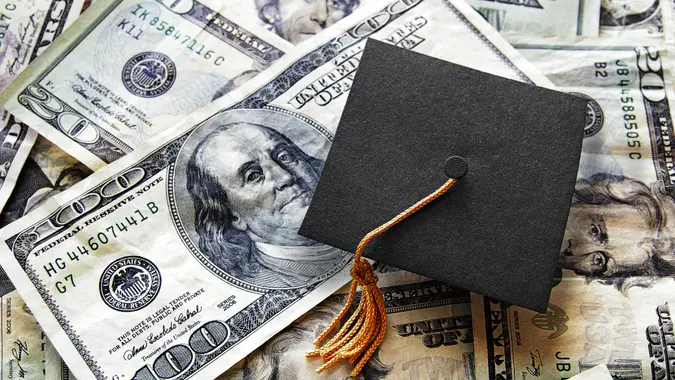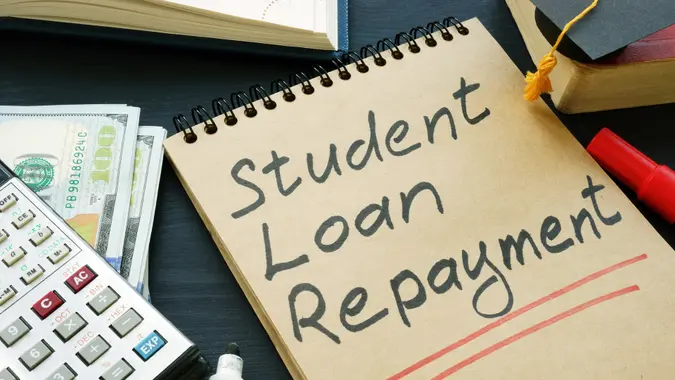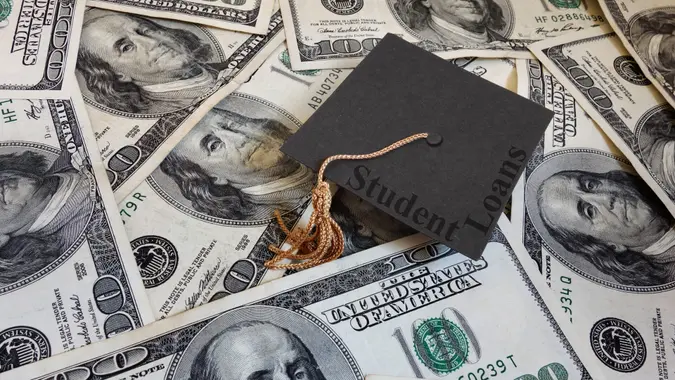I Just Paid Off My Student Loans 8 Years Early: Here’s How

Commitment to Our Readers
GOBankingRates' editorial team is committed to bringing you unbiased reviews and information. We use data-driven methodologies to evaluate financial products and services - our reviews and ratings are not influenced by advertisers. You can read more about our editorial guidelines and our products and services review methodology.

20 Years
Helping You Live Richer

Reviewed
by Experts

Trusted by
Millions of Readers
According to Experian data, the average student loan balance for all borrowers was $38,787 in 2023. Americans owed $1.75 trillion in some sort of education debt as of the first quarter of 2024, per Federal Reserve data. So it’s not exactly a secret that student loans are a burden to many Americans and that graduating with a significant amount of debt can hold you back as a young professional.
This is why we spoke with someone who was able to pay off their debt earlier than expected to see what advice they could share for those who feel stuck.
How Eric Paid Off Student Loans Early
Eric Rosenberg, finance expert and founder of Freelancer Dashboard, paid off his student loans two years and six days after his graduation, eight years ahead of the original 10-year plan. Here’s what he did to pay off his loans ahead of schedule.
Set a Strict Budget
“To pay off student loans early, try to keep your budget as low as possible and funnel every available dollar into your loans,” noted Rosenberg. “I put all of my tax refunds and my bonus from work into paying off my loans early.”
Rosenberg acknowledged the importance of making debt repayment a priority as he knew that he wanted to tackle his student loans before he could make other financial moves. He kept a strict budget, limited his expenses and focused on allocating all of his extra funds toward becoming debt-free.
Change Your Payment Schedule
Rosenberg pointed out that paying every other week instead of monthly helps in several ways. He knew that altering his payment schedule would make a significant impact so he set up his finances to make this happen.
Rosenberg added, “Doing so can better align your income and expenses, and it builds in a full extra monthly payment each year.”
Increase Your Payments
“I increased my automatic payment every few months until I was paying more than double the monthly minimum,” shared Rosenberg. The final step involved increasing his payments so that he would speed up the process since he didn’t want to spend a decade paying off his education debt.
Rosenberg concluded, “Combining those strategies, my balance fell quickly and I was debt-free in about two years.”
How You Can Pay Off Student Loans Early
We spoke with more experts who shared insights on paying student loans off early if you’re looking to accomplish something similar.
1. Research Your Loan Terms
“Paying off your student loans requires a combination of strategic planning and disciplined execution,” said Erika Kullberg, attorney, personal finance expert and founder of Erika.com. “But before you get to that point, you’re almost certainly going to have to do tons of research to completely understand your loan terms and what repayment strategies are actually available to you.”
The first step to paying off student loans early will involve reviewing your terms so that you’re aware of your options. You could also apply for relevant programs to get some student loan relief based on your circumstances.
2. Create a Detailed Budget
“Once you’ve learned how to make a detailed budget that accounts for all of your income and expenses, you can identify areas where savings can be made by cutting unnecessary costs,” remarked Kullberg.
If you want to make paying off your student loans a priority, you’re going to have to find a budgeting system to follow so that you track your spending to ensure you stay focused on making this goal a reality.
3. Tackle the Highest-Interest Debt First
While Dave Ramsey’s proponents often follow the debt snowball strategy, where they try to pay off their lowest balance first to build momentum, some experts believe that you should focus on your highest interest rates when it comes to student loans.
“Prioritize paying off loans with the highest interest rates to save on overall interest payments,” said Taylor Kovar, CFP and founder of 11 Financial. “Allocate any extra funds toward these loans while making minimum payments on lower-interest loans.”
This strategy is known as the avalanche method and it can help reduce the total amount you spend on interest. The strategy for paying off debt will depend on your situation and what your balance looks like.
4. Make Additional Payments When Possible
“Whenever possible, make additional payments or apply any windfalls, such as tax refunds or bonuses, directly to your student loan principal,” shared Kovar. “These extra payments can help reduce the balance more quickly and save on interest costs.”
The experts agree that doing your best to make extra payments will speed up the process. As frustrating as this can be at times, the good news is that the sooner you pay off this debt, the sooner that you can focus on building wealth.
Kullberg added, “Refinancing, supplementing your income with a side gig and just being consistent in your budgeting discipline are all viable tools to help you pay off student loans early.”
You may want to see if you can find a side hustle or some sort of gig that brings in extra money so that you’ll have more funds to allocate toward your debt.
5. Look Into Refinancing
You may want to consider refinancing your student loans to obtain a lower interest rate or better terms. Refinancing can help reduce your monthly payments or shorten the loan term, but it will depend on what options are available to you.
6. Accelerate Payments
“To accelerate repayment, increase your monthly payments beyond the minimum required,” Kovar advised. “Even a small increase can significantly reduce the loan term and total interest paid.”
You’ll want to ensure that you follow the first step and create a budget to find additional funds that can be redirected toward your student loan payments. The goal is to find a way to pay off your student loans early so that you can be debt-free.
More From GOBankingRates
 Written by
Written by  Edited by
Edited by 
























